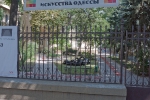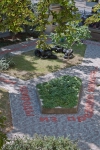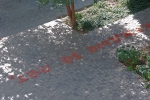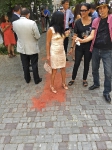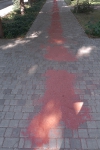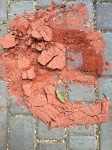IV Odessa Biennale of Contemporary Art
26.08.15 – 02.10.15
The Museum of Odessa Modern Art
65014, Odessa, Belinskogo str.5, Ukraine
Michael Hofstetter:
Моя философия: уничтожение старых городов, сел, через каждые 50 лет, изгнание природы из пределов искусства,
(My philosophy is: the destruction of old cities and villages every 50 years, the expulsion of nature from the realm of art,)
2015,
50 x 4300 x 2 cm,
Colored Sand, Intervention in The Museum of Odessa Modern Art
In 1916 Kazimir Malevich wrote to Alexandre Benois, a very important critic, painter, and
writer of the avant-garde movement in St. Petersburg who criticized very sharply Malevich's Black Square, first shown in the exhibition „0,10" in St. Petersburg in 1915. The following letter from Malevich rebuffs Benois' criticism.
In 2015 Michael Hofstetter is invited to participate in the 4th Odessa Biennale of
Contemporary Art. Taking a quote from Malevich's letter, Hofstetter uses sand from one of Odessa's beaches to write it on the pathways of the museum's garden. Entitled Manifesto, the response from viewers at the opening is the complete destruction of the sentence—only the words „My philosophy is:" remained.
Letter from Kazimir Malevich to Alexandre Benois
May 1916, Kuntsevo
Much Esteemed Mr. Benois.
Your colleague, Mr. Merezhkovsky, wrote of Futurism as a coming movement of boors rising up against sacred art.
What offended Mr. Merezhkovsy most of all was the boor's renunciation of "the beautiful, eternally feminine" Psyche – in favor of the mechanical reproduction of man.
Mr. Merezhkovsky found himself afraid that the coming boor would tear his female away from him, and he started howling and grew jealous, like a real baboon or a Hottentot who had grown used to his female and his habits.
Futurism slapped his taste in the face and placed the machine on a pedestal, its speed being the new beauty of modernity.
Embittered by this outrage, and exhausted by the malice (in this solid, fat, and not altogether dull article), I could only curse, like a lady street hawker whose tray of Greek trinkets has been overturned.
But in spite of his abuse, l like him for his straightforwardness (simple as a cabby), his defense of the Psyches.
He's not like you.
You are a little cleverer. Isn't that so?
When push comes to shove, you will turn out to be my defender.
You "don't believe in backwardness." That's already promising.
Merezhkovsky is not as politic, and with his straightforwardness has uncovered the hopelessness of hope.
He is loyal to his master.
And although nothing is left of his master – just the supports – he still honors him and awaits his resurrection.
That poor elder, the serf owner of Greek art, who feeds on the leftovers of the landlord's former splendor, dragging out his existence on the ruins of the cemetery of Greek and Roman art.
He keeps waiting, thinking that any minute now they'll bring the famous Caesars. But alas! Centuries go by, but no dead are brought to the cemetery.
Still more years pass: the gates and tombs have fallen into even greater ruin and the ground has laid bare the bones.
And still no dead are carried through the gates, and from the tombs no one has arisen.
And the old watchman, having lost his wits, but still a loyal slave to the Caesar, grabs his protruding bones from the earth and raising them high above his gray head, runs all around the century that he cannot comprehend, screaming of their beauty.
But the gods have died and will not rise again!
That is how the elephants died, bearers of the Indian, Egyptian, Greek, and Roman cultures of art.
But those were elephants that bore the culture of their own times.
But in your time there were no elephants.
And the Elephant of which you write is no elephant at all, but a Russian wolfhound. a beater. Its job is to herd the young generation of our century into the dark catacombs of the past.
But it's not working.
The boors keep coming, one after another. And how many of them have passed through in our own day.
Monet. Courbet. Gauguin, Van Gogh, Millet, the boor Cezanne. and the even more boorish Picasso and Marinetti (not to mention us homegrown boors).
And Merezhkovskv stands in the square of our new century. among the mad whirl of motors in heaven and on earth warching with crazed eves, still holding the bone of Caesar, and screams of beauty.
But his words are not heard in heaven. and on earth the roar of the propeller is closer. more easily understood.
But the elephant grows faint from exhaustion! And I think that your confession is not ironic. that you have in fact uncovered a great hollow.
Yes, the ancient elephant has perished. fattened with wine and the debauched body of Venus!
Not even the holy Madonnas could raise him up.
The coming boor has come and trampled its drunken body into the ground.
And your confession to your "colleagues" ''that we are in truth the decadents of the whole world'' – you too risk being crushed. (I like this very much, truths are pleasant.)
But Mr. Benois! Is it really a boor that has come1
Do boors desire to erect the new.
Do boors strive to escape from yesterday,
in order to enrich themselves with new, healthier forms of Art?
Do boors exhort their generation to grow its fruits in its own garden, with its own hands.
After all, everything we see in the fields of art is just the same old rehashing of the past.
Every half century our world is enriched by the art of the creative genius of tech-nology. But the World of Art – with what has it enriched its age? Presented it with a pair of crinolines and a few uniforms from the time of Peter.
That is why I summon only those who are with me to give the present time the fruit of their art.
And I am overjoyed that the face of my square cannot blend with any particular master, nor with any other time. Is that not so?
I did not listen to the fathers and I do not resemble them.
And I am a rung on the ladder.
I understand you, you are the fathers and you want your children to resemble you. And you drive them to the pasture of the old, and you brand their young souls with a stamp (of loyalty), as passports are stamped at the precincts.
Covered in dirt and fallen a thousand years behind, they come out decorated with that stamp and wander without a path, not knowing why and where and for what (the free artists).
You have stripped the museums and the academy of any real meaning.
You have made them strictly party-line exhibitions. And also a weapon and a prison's torture devices, for restraining free-thinking.
There you set up the templates and created glory for them: and whoever is true to your templates is hung next to you.
That is how the traps of stagnation are made.
And the impoverished young, destitute of spirit and hungry for glory, make for the template.
Cezanne, the greatest of masters, and the Boor of France, died without having gained the honor of hanging with you. But Mashkov, Konchalovsky – distant scions of his truth – there they are, showing off!
Look at how they yielded, how they fell to their knees, those hungry for glory! And your system triumphs.
You've made provisions for it all and spread out your barbed-wire barricades everywhere, leaving a single chink through which to get to your template.
In your hands are all the weapons for erasing those who do not resemble you. But canvas is strong and the attic is the boor's gallery and museum. From there your grandsons will bring out the canvases and break your system's neck.
All I have is one naked icon of my time, without a frame (like a pocket). so it is hard to do battle.
But the joy of not re embling you gives me the strength to go further and further into the emptiness of the desert. For there i only transfiguration there.
And it seems to me, your rebuke that my philosophy resembles that which blows own millions of lives is mistaken. Do you not all resemble a fire that obstructs my and all movement?
My philosophy is: the destruction of old cities and villages every 50 years, the expulsion of nature from the realm of art, the destruction of love and sincerity in art, but it is not the killing of the living source – man (war).
But your elephant is old and doddering. And, as president of the critics, you are not the only one who admits it – many newspaper pawns do too. Neither the wandering fops. nor those of spring and autumn are satisfying (the exception is yourself, whom thev do satisfy), but even those from the union are demanding something new.
The movement in search of a new man and new paths is evident.
They even travel to India and Africa, they dig around in the catacombs. they fast for 40 days and nights in the graveyards of buried cultures (do you think they'll find it?). They publish a mass of books (Uspensky), prescribe fasting, take castor oil (but finally it seems it only serves to purge the stomach).
And the question begs to be asked of you and all the others: do you have a clear image of what you are looking for?
The ancient magi had a guiding star (the Almighty saw to that). Do you have an indicator. and will you be able to recognize what you are looking for? Will you not walk ["past" is crossed out – I. V.], like the Jews past Christ?
Who knows. perhaps these new men can be met a thousand rimes right here, in some Bannyi Lane or other.
There have been many new men, but some of them were only recognized when they were already dead.
But who has been given the task of finding those that are living1
It must have been given to you, and to the commissions of the museum s.
But good lord. That really is a merry and warm "keatre."
Those fossils that have spent the last twenty years reading Tretiakov's will and are forever busy weighing this and that – are they really capable of keeping an eye out! Any waxworks will pay big money to the city government for this commission and they'll be able to use them to acquire "fruits."
But they are given the right to judge! ...
In art there is an obligation to execute its essential forms. Irrespective of whether like them or not.
Whether you like them or not, art does not ask you about this, as it did nor ask when it created the stars in the sky.
And thanks to your "love" and your "pleasing," you and your right-wing colleagues can 't manage to leave behind the crinolines. And you 're happy and hot (go ahead and warm yourselves – we didn't have heat at our place on the Field of Mars) .
Yes, you who have become accustomed to warming yourself by a pretty little face, have trouble warming up to the face of a square.
I agree that Venus would be a bit warmer. But a Dutch stove is warmer still. However, the warmth of the first doesn't appeal to me.
It stinks too much of the caesars' sweat!
And what does warmth have to do with creative work, can one real ly nor create in the cold , and coldly create?
In spite of the fact that it's happy and hot at your "carnival ,'' why isn't there any creativity?
After all, your art is an art of illustrating anecdotes from history, a visual aid for textbooks. (Shishkin the Botanist.) But definitely not creative art. That's what you should be bombarding: the academy and its heavyweights, the forty-pounders . Now that's truly vileness and desolation.
That' s where you find a paucity of the kind of spirit you can't buy.
But what's spirit to them, all they want is for people to buy pictures, and you as president of criticism will always be there to hide with your robes the trust of the fop who took his last diamond to the pawnshop and drank away his last pair of trousers. No, Mr. Benois, you won 't find the secrets of incantation and drive me into that herd of swine. For the secret of incantation is the very art of creating, and it exists in time, and time is greater and wiser than swine.
And you will never see the fair Psyche's smile on my square.
And it will never be a mattress for lovemaking.
K Malevich.
1916. May.
Kuntsevo Alexandrov Railroad, dacha Barish, No. 7.
P. S. In light of the fact that the doors to the press are [so far ?] closed to us, I am writing to you personally.

